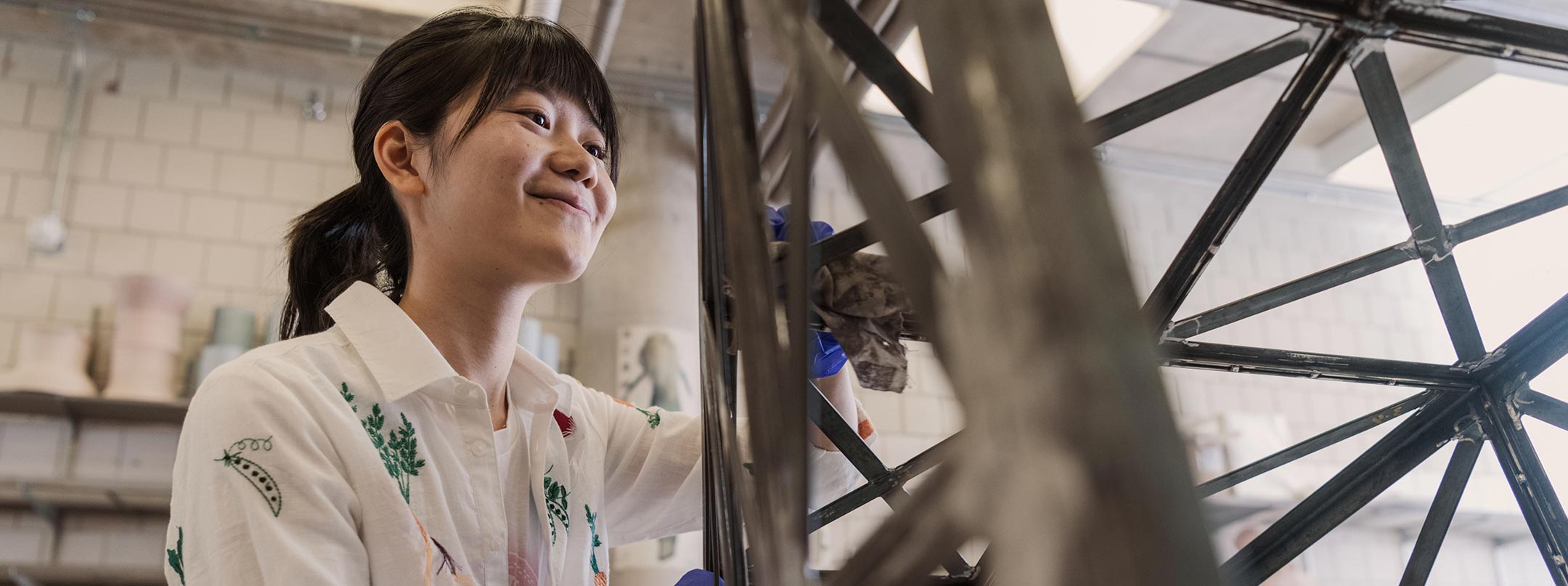Interdisciplinary Studios

A longstanding College of Design tradition, interdisciplinary studios are the original sandbox for innovative, multidisciplinary explorations in design.
Every spring semester, the college offers approximately 15 advanced, project-based studios (DSNS 5460 courses) that examine diverse themes in the built environment, design, and the arts. They provide 250 to 300 students from all College of Design majors an opportunity to engage in different challenges, different scales, and different patterns of work. These studios, which are often co-taught by faculty from different departments, are open to juniors, seniors, and graduate students. Many interdisciplinary studio topics align with the United Nations’ Sustainable Development Goals.
Current Studios
Explore the interdisciplinary studios that were available to students for the Spring 2025 semester.
Past interdisciplinary studio opportunities
Mayors’ Design Workshop: Civic Hydrology – Atlantic, Iowa
Students from diverse design disciplines engaged in an immersive, community-centered experience. They explored the intersection of water infrastructure and placemaking through real-world challenges. By conducting fieldwork, drone mapping, and collaborating with local stakeholders, students developed integrated design strategies that supported flood resilience, ecological health, and civic connectivity. Rooted in sustainability and community impact, the studio fostered innovation, critical thinking, and meaningful engagement with pressing environmental issues.
Hospitality Studio, Japan
In this collaborative studio, student teams designed a destination hotel in rural Japan’s Shimane Prefecture. The project focused on creating a unique hospitality experience that blends regional culture with thoughtful design. Proposals addressed the needs of both leisure and business travelers, emphasizing comfort, functionality, and a strong sense of place.
As part of the studio, students participated in a 7-day trip to Japan, gaining valuable cultural insight and hands-on experience that enriched the design process. Students also took part in a three-day design workshop with peers from Shimane University, deepening their understanding of place-based hospitality through international collaboration.
Paper Palaces: The World’s Fair in Japan
Students explored the history and impact of the World’s Fair through the lens of print media and design. Combining studio practice with art history, students investigated how print has shaped presentation, advertising, and identity in global exhibitions. Through research and hands-on making, they created both 2D and 3D print-based work that responded to themes of representation and world-building.
The course concluded with a 15-day study abroad experience in Japan, including a visit to the 2025 World Expo in Osaka and a traditional mokuhanga workshop in Echizen.
Bio Design Challenge 2025
In this interdisciplinary studio, students explored the intersection of biology, design, and technology through the Biodesign Challenge, a global competition focused on sustainable innovation. One team was selected to present their project, “AlgaeLink,” at the 2025 Biodesign Challenge Summit in New York City.
The studio encouraged students to think critically about global challenges and design imaginative, science-based solutions with real-world impact.
Mayors’ Design Workshop: Civic Hydrology – Cedar Falls, Iowa
Students visited Cedar Falls, Iowa, to explore design opportunities for transforming a flood-prone area into a vibrant recreational district along the Cedar River. They developed strategies to enhance quality of life for residents while creating a destination that draws visitors and strengthens community connections.
Great American Rail-Trail: Mappings & Folksongs
This studio explored trail and greenway design through the lens of the Great American Rail-Trail. Students examined how trails can connect communities, support ecosystems, and shape both rural and urban landscapes. Through mapping, fieldwork, and community engagement, they developed ideas for multifunctional corridors that promote cultural, ecological, and economic vitality. Site visits included Boone County, Iowa, and Washington, D.C., offering diverse perspectives on trail-oriented design.

A Cyclone in the Making
Find your place at Iowa State University’s College of Design, where we like to ask questions, poke and prod, create something new, and make a difference through design.
